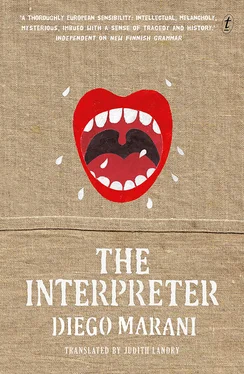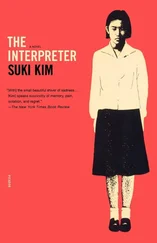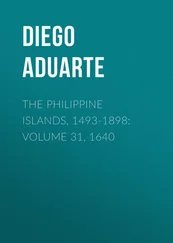At first light I peered through the shutters to see a dismal expanse of mud: grey houses and office blocks reflected in motionless water. Magda was asleep; my head still full of dreams, in the half-light I thought that the body lying beside me under the covers was that of Irene. My thoughts wandered skywards, lifting me far above that drab hotel, above the town and further still, into an aeroplane, so that the desolate roads I had been driving along were now no more than brownish scribbles in a sea of mossy green. Then, in a flash of clarity amidst the inchoate clouds that were my thoughts, for a moment I saw myself, alone in a strange land, playing the bandit. I looked incredulously at my disaffected body, apparently now cured; I opened my hands and became absorbed in the network of lines I saw there. Were they still my own? I listened nervously to my heartbeat, thinking I detected a new violence in it. Perhaps this recklessness was simply the new form my illness had assumed. In order to escape me, rather than transforming my body, it had transformed itself. Coming up against the dogged resistance of a disordered will, it had tried to attack me in a more cunning fashion; now it was altering my perception of things, seeping into my mind, first squeezing out the less essential substances, those fostering common sense and moderation, then moving on to the juices of consciousness and memory. If, for the moment, I was a mere bandit, perhaps I would soon become an out-and-out assassin, a sadistic torturer.
It was Magda who aroused me from these thoughts; she had woken up suddenly, and wanted to go down to the reception desk to try the phone again. We dressed in haste, in silence, almost without looking at one another. We crouched down behind the half-open door, then went out into the corridor one after the other. I went down first, but on the stairs I heard the porter repeating the number of Magda’s room, and her name, in tones of some alarm. I sat down on a step and peered into the foyer: two policemen were positioned by the entrance, while another four were preparing to come up the stairs, taking their pistols out of their holsters as they did so; another was keeping an eye on the lift. A police officer in a black raincoat was glowering at the photo in the newspaper the porter had opened up before him. I beat a hasty retreat in order to warn Magda, then, turning round, noticed a little flight of metal stairs by the lift-shaft, leading into the basement. We crept down the metal stairs; above us we could hear hurried steps, doors banging, policemen shouting. We scrambled through a window, ran through the mud to the supermarket carpark and drove off into the blue yonder, amidst a blare of sirens from fire engines and ambulances which were foundering in the puddles and sending murky ripples eddying around them.
I was driving through a dim blur of flooded fields, the wrecks of floating cars and uprooted pylons, trying to get my bearings, when I heard Magda burst into sudden laughter behind me in the back. I glanced at the rear-view mirror: I thought I caught a glint of ferocity in her eyes, a flash of cruelty.
‘Felix Bellamy, now that I’m the accomplice of the Beast of Bukovina, I want to carry out a robbery of my own! I want to see people falling to their knees in front of me, I want to shoot at windows and glasses and mirrors! I want to smell the scent of fear, of blood, of gunpowder! Stop — I want to come in front!’ I heard her shout.
As the road curved steeply down a long hill, we sighted a service station on the outskirts of Salinta; Magda went in first to ask for directions. Several foreign lorry drivers were camping out in the place, immobilised by the bad weather; their vehicles were parked in the space behind the petrol pumps, wheels sunk in the mud. I burst in a few seconds after her, pointing my pistol at their dull-eyed, weary faces.
‘Throw your wallets onto the floor and you won’t come to any harm!’ I shouted. Magda turned away from the counter and walked around among the tables, translating my threat to our astonished crowd of victims in several languages. I heard her speaking German, English, Italian and Dutch, and realised that she must have looked at the number plates of the lorries before coming in.
That evening, in a hotel in Arad, we read the headlines in the Jurnalul National : ‘Country cut in two by floods — traffic at a standstill’. Then, lower down: ‘Bonnie and Clyde of the Carpathians still up to their monkey tricks with the police — Swiss bandit and accomplice sighted at Oradea — petrol station plundered’. I read the entire article and discovered to my fury that I was being held responsible for Radu’s death as well: ‘Ravaged body of lorry driver from Chisinau murdered by Swiss thug found in Ukrainian countryside’, was how the journalist put it. Below was a passage in italics which I have in my wallet to this day:
In these difficult times, our hapless country has suffered all manner of woes, from corruption to economic decline, from unbridled pollution to the most savage violence. Having rid ourselves of dictatorship, we deluded ourselves that the worst was over, and that a new prosperity might dawn at last, even in this dismal land. But, given half a chance, the first thing our people do is emigrate, which is their only chance of giving their children a decent future; our orphans are dependent upon charity. We have become a repository of cheap labour for the rich countries, in a word, we export poverty — that is our greatest resource. Everything else must be imported. Except for criminals, that is: our home-grown type is every bit as competent as the imported variety, and certainly more respectful of local customs. Above all, they go about their business in a more mannerly, more elegant fashion, homing in on ministries rather than on highways; using paper rather than guns. Lulled into a sense of false security, the Romanian people still feel that there is some point in going to work; basically, this too is a form of ethical behaviour, and in the long term — all forms of social evolution are slow-moving — some good is bound to come of it. We knew that the Swiss made chocolate and founded the Red Cross, that they were partial to orderly traffic and neat flowerbeds. Now we know that even the snow-clad Alps may breed outlaws of the most murderous stripe. The base individual who is terrorising our roads offends us more by his provenance than by his turpitude; his forays wound our national pride more than they do our pockets, because even the poorest Swiss lives like a nabob in comparison to his Romanian equivalent, and if there was one humiliation we had yet to experience, it was that of being robbed by a descendant of William Tell. How many Romanians will Felix Bellamy still have to rob before he amasses the booty he would acquire by robbing one single man in his own country? Why carry on targeting the ill-stocked coffers of failing petrol stations or the grubby wallets of a few lorry drivers when he has friendly dealings with banks and ciphered accounts? Clearly, we’ve entered the age of globalisation with a vengeance, we are part of a game which is no longer under our control. Thus we find ourselves almost regretting our own well-upholstered ministerial thieves; they were almost appealing in their restraint. But looking at it from a strictly economic point of view, what interest would a Swiss thief have in coming here? Of course it must be easier to gull our poor ill-armed police, to dupe our down-and-out secret services, to shake off our ramshackle black Marias with sleek foreign vehicles than it would be to challenge the well-trained, well-equipped Swiss federal equivalent. Felix Bellamy, if you’re a man, take yourself off to Norway or Liechtenstein, and leave us to starve in peace.
We were now hell-bent on thievery; Magda took an insane pleasure in it, as indeed did I. After each strike, she’d leap into the car holding her breath in her trepidation, fear and excitement written on her every feature; then, as soon as we were at a safe distance, she would burst into laughter, banging her fists on the seats in jubilation and shouting out curses. She had persuaded me to let her hold the gun, and I felt she cut a stylish figure when she planted herself at the counter, legs apart, gripping the weapon with both hands. I trusted her; I sensed that she had an innate love of danger, but that she also knew how to change course rapidly if circumstances required it. I didn’t even resent the fact that she would waste cartridges by shooting at windows and electronic games. She was capable of carrying out robberies entirely on her own, and I let her have her head; all I could do was follow her — it was she who was now the ringleader.
Читать дальше












